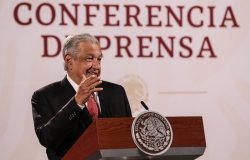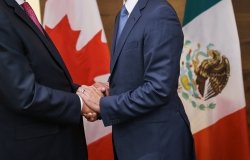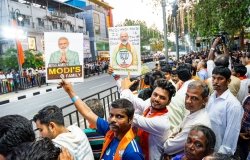The Public and Mexico's Presidential Election
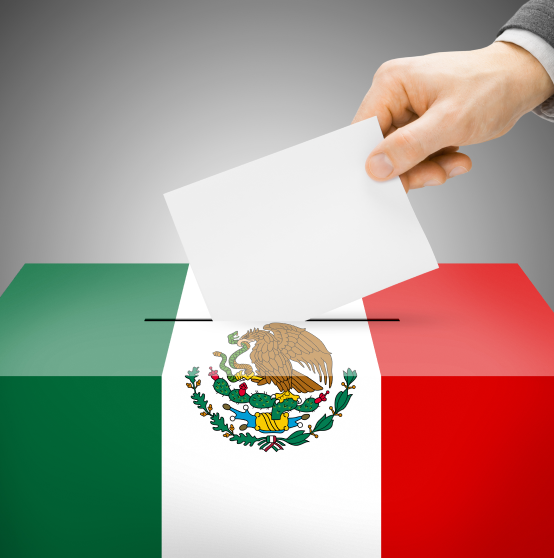
Shutterstock
Next June, Mexico will most likely elect its first-ever female president. While the identity of Movimiento Ciudadano´s presidential hopeful is still unknown, Claudia Sheinbaum will surely be the candidate of the incumbent party Morena, while Xóchitl Gálvez will be nominated by the PAN-PRI-PRD coalition known as the Frente Amplio. Sheinbaum and Gálvez are the leading contenders. What do polls tell us about the race?
Graph 1 shows the results of all face-to-face national polls that have been published until now. In every one of them, Sheinbaum leads by a wide margin, but her numbers show a high variance. In some polls she gets over 70 percent of support, while in others she gets 50 percent. (for comparison to different firms, poll numbers have been recalculated excluding the non-response). Likewise, since September Xóchitl Galvez’s numbers have hovered between 20 and 35 percent. Oraculus´ poll of polls estimates have Sheinbaum at 55 per cent and Gálvez at 32 percent.
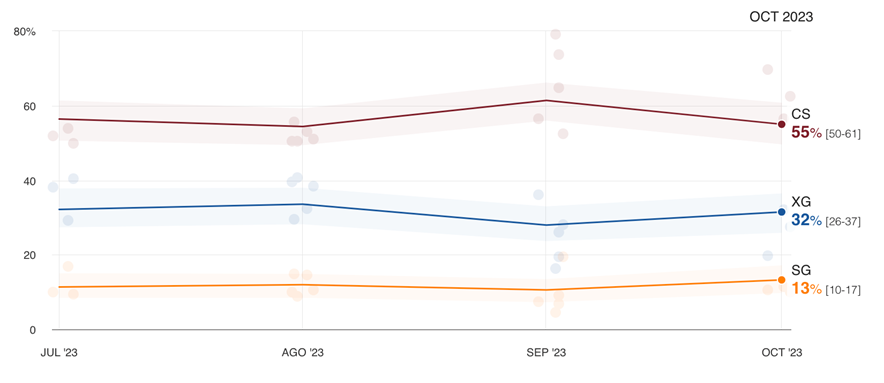
oraculus.mx
Source: oraculus.mx
The volatility of polling numbers is obviously related to the fact that the contest has not officially begun and the identity of at least one more candidate is still unknown. By law, the electoral campaign will not begin until March 2024 while candidates must be registered the month before. Polls, however, still can give us some important clues about the candidates´ standing and the direction the race can follow.
First, there is an important gap in name recognition between Sheinbaum and Gálvez. Our own national poll published recently in El Universal newspaper shows a gap of 20 percentage points in name recognition. Gálvez is currently known by just half of the Mexican electorate. This gap will certainly shrink as the race progresses, but it will be key how Gálvez gets to be known by the Mexican public. President López Obrador´s criticisms of Gálvez candidacy have been very effective and polls show that her favorability ratings are in neutral territory, that is, the positive opinions about her equal the negative numbers. If she does not reverse this trend, it will be very tough for her to defeat Sheinbaum, as the latter´s image is quite strong after Morena´s nomination process.
After 5 years of Lopez Obrador’s government, the image of Mexico's main opposition parties show the wear and tear after the constant criticisms delivered from the presidential pulpit. Opinions about PAN, PRD and PRI are mostly negative. While for many Gálvez is an outsider politician, she will be nominated and supported by the parties that ruled Mexico for the past decades. A formidable challenge for her will be to convince people to vote for the person and forget about the parties behind her candidacy.
Morena, on the other hand, enjoys a very strong standing among the Mexican public. Its favorability ratings are impressive, and they have been reflected at the polls as Morena has won most of the gubernatorial races in Mexico since 2018. Now, the party holds the governor’s office in about 2/3 of the Mexican states.
The generic vote for President reflects this reality. Poll after poll show Morena to be the party that most people would vote for. According to Oraculus’ poll of polls, the generic vote for Morena is 54 percent while the PAN is in a distant second place with 19 percent of support. This gap in support is the main reason behind the PAN-PRI-PRD coalition—they are too weak individually. The coalition’s generic vote is 36 percent. It is still far from Morena and its allies but at least the coalition is more competitive.
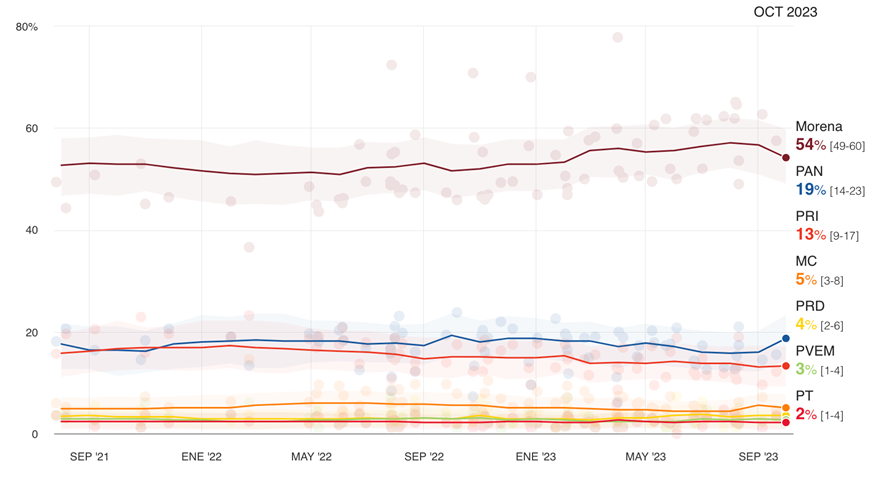
oraculus.mx
Source: oraculus.mx
Graph 2 also shows what can become a key feature of the 2024 presidential race: the remarkable stability of electoral preferences. Since 2021, the generic presidential vote does not show relevant changes. Morena´s electoral strength has moved in the 52-57 percent range. This is quite different to what happened in the years prior to the 2018 presidential election. In those years an unpopular PRI president, together with the rise of Lopez Obrador’s candidacy, translated into important changes in partisan support.
One sign of partisan polarization is the crystallization of partisan and political attitudes. In such context, electoral campaigns may have a limited impact on electoral preferences. For the 2024 presidential race to be a competitive one, a good deal of voter volatility will be necessary.
*Jorge Buendía and Javier Márquez are founding partners of the Buendía & Márquez polling firm based in Mexico City. Both are also co-Founders of the Oraculus polling aggregator website. Buendía is also a Wilson Center Global Fellow.
About the Authors

Mexico Institute
The Mexico Institute seeks to improve understanding, communication, and cooperation between Mexico and the United States by promoting original research, encouraging public discussion, and proposing policy options for enhancing the bilateral relationship. A binational Advisory Board, chaired by Luis Téllez and Earl Anthony Wayne, oversees the work of the Mexico Institute. Read more




